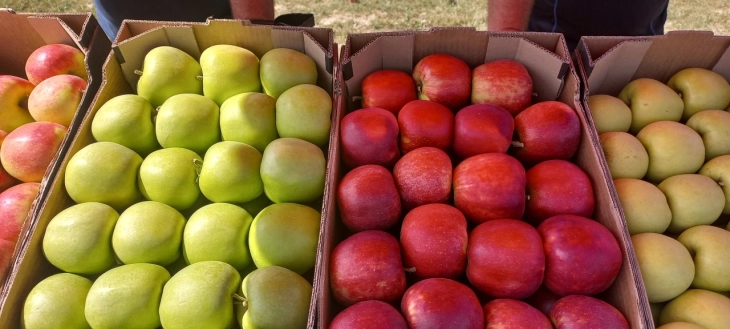Macedonian apples most affected by Russian sanctions, exports of peaches, cherries uncertain
- The ban on importing Macedonian fruits introduced by Russia late last year affects apples, peaches and cherries the most. The authorities are working hard to lift this ban, hoping it occurs by spring, because it’s very difficult to find alternative markets for these fruits in the meantime, according to Trajan Dimkovski of the Ministry of Agriculture, Forestry and Water Economy.

Skopje, 10 February 2023 (MIA) – The ban on importing Macedonian fruits introduced by Russia late last year affects apples, peaches and cherries the most. The authorities are working hard to lift this ban, hoping it occurs by spring, because it’s very difficult to find alternative markets for these fruits in the meantime, according to Trajan Dimkovski of the Ministry of Agriculture, Forestry and Water Economy.
"We export around 15-20,000 tons of apples to the Russian market each year, 50% of our overall exports, 60% of peaches are exported to Russia, and cherries are 100% exported to Russia, anywhere between 1,000-1,500 tons," Dimkovski told the press Friday, adding that apples were most affected by this ban despite the current “dead period.”
“We hope things clear up by spring, because it will be very bad for business if peaches remain under this export ban. It’s hard to find an alternative market because the competitive market in Greece has special types of peaches. 5,000-6,000 tons of peaches go to the Russian market out of 8,000-12,000 tons of produced peaches.
“The farmers that got the message years ago that Idared apples will struggle to breach new European markets changed their assortment and now export to more than just European markets. Idared can only thrive in Arab countries, in the East and on the Russian market, and it’s 80% of our assortment. It will likely get processed and get exported that way at a much lower price. Apples for consumption are sold at Mden 8-10 per kilogram, and industrial apples cost Mden 5 per kilo,” Dimkovski said.
“We ended the past years at 50% yield handover to processing capacities, which is impermissible and economically unjustified, and we have to see how things go this year. There is an industry in each area of production, up to 20%. That’s why the measure exists to support a good deal of apples with Mden 3 per kilo, which encompasses the entire yield from September 15 2022-May 15 2023, when they’re handed over to local buyers,” Dimkovski said.
Russia similarly banned peaches three years ago, and Dimkovski hopes for the ban to be lifted, which is why they were working with the Macedonian-Russian chamber, he said. dk/mr







